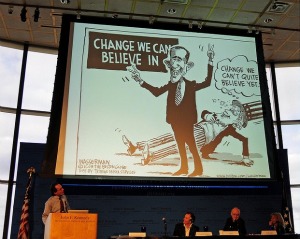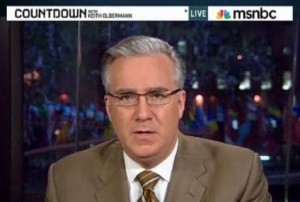How many trees had to die so that the Boston Globe could stop cartoonist Dan Wasserman from raining on the Museum of Fine Arts’ parade?
Earlier this weekend, Media Nation heard that the Globe had killed a cartoon by Wasserman that was scheduled to run on today’s editorial page. Sure enough, you will find a guest op-ed headlined “The tech-politics divide” where Wasserman’s cartoon ought to be.
Then, this morning, I received a PDF of the page — already printed — from an anonymous source. The cartoon is vintage Wasserman, poking vicious good fun at the MFA and at Bank of America. I asked Wasserman to tell me what happened, and here is the full text of his e-mailed response:
The cartoon was held but is scheduled to run next Sunday. The publisher [Christopher Mayer] was concerned that the MFA, on the day it was celebrating the opening of its new wing, was being nicked in a cartoon that was aimed at Bank of America. I was out of the office on Friday, and because of early weekend deadlines, the cartoon was coming off the presses before he could reach me to talk it through. I’m disappointed it was held. It’s a strong, timely cartoon.
Because Wasserman says the cartoon will run next Sunday, I’ve decided to hold off from posting the PDF.
The PDF is clearly a scan of a printed page. How many Ideas sections were printed and discarded after management decided to spike the cartoon? I understand it may have been quite a few, but I don’t have a confirmed number.
I also asked the Globe’s spokesman, vice president Robert Powers, for comment. He sent along the following statement a few minutes ago:
We do not comment on editorial decisions. Unfortunately, due to early printing deadlines, the section had already started to print. No one outside of the news and editorial process for The Boston Globe is ever consulted about news and editorial decisions.
No question the Globe has invested a lot in its coverage of the MFA’s $500 million expansion. The paper published a 56-page color glossy magazine commemorating the event (we got two, since it was also included in the New York Times), featuring, among other things, a full-page ad from — yes — Bank of America. There’s an interactive special at Boston.com as well.
All good stuff. But there was nothing out of bounds or offensive in Wasserman’s cartoon. It should have run.
Photo (cc) by Tony the Misfit and republished here under a Creative Commons license. Some rights reserved.





 On Saturday night, during a long drive home from Providence, I listened to the pianist
On Saturday night, during a long drive home from Providence, I listened to the pianist